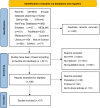Barriers and Facilitators of Medication Adherence in Hypertension Patients: A Meta-Integration of Qualitative Research
- PMID: 38549805
- PMCID: PMC10976505
- DOI: 10.1177/23743735241241176
Barriers and Facilitators of Medication Adherence in Hypertension Patients: A Meta-Integration of Qualitative Research
Abstract
The aim of this qualitative systematic review is to analyze the barriers and facilitators to the uptake of antihypertensive medication in hypertensive patients. The databases of PubMed, Embase, Web of Science, CINAHL, Cochrane Library, MEDLINE, China National Knowledge Infrastructure, Wanfang, VIP, and Chinese Biomedical were searched from inception to June 2023. The studies were screened, extracted, and assessed independently by two researchers. Previously, the researchers used the Joanna Briggs Institute Critical Appraisal Checklist for Qualitative Research to assess the quality of the included studies. A total of 27 studies were considered, resulting in two combined findings: a good level of knowledge, belief, and behavior and adequate social support were facilitators of medication adherence in hypertensive patients. In contrast, lack of medication literacy, difficulty adapting to roles, reduced sense of benefit from treatment, limited access to healthcare resources, and unintentional nonadherence were barriers. Medication adherence in hypertensive patients remains a challenge to be addressed. Future research should explore how complex interventions using a combination of evidence-based strategies and targeting multiple adherence behaviors (eg, long-term adherence to medication) are effective in improving medication adherence.
Keywords: hypertension; influencing factors; medication adherence; meta integration; qualitative research.
© The Author(s) 2024.
Figures
Similar articles
-
Adherence to HAART: a systematic review of developed and developing nation patient-reported barriers and facilitators.PLoS Med. 2006 Nov;3(11):e438. doi: 10.1371/journal.pmed.0030438. PLoS Med. 2006. PMID: 17121449 Free PMC article. Review.
-
Barriers and facilitators to dementia care in long-term care facilities: protocol for a qualitative systematic review and meta-synthesis.BMJ Open. 2023 Nov 1;13(11):e076058. doi: 10.1136/bmjopen-2023-076058. BMJ Open. 2023. PMID: 37914310 Free PMC article.
-
Barriers and facilitators to physical activity among ethnic Chinese children: a qualitative systematic review.JBI Evid Synth. 2020 Dec;18(12):2445-2511. doi: 10.11124/JBISRIR-D-19-00154. JBI Evid Synth. 2020. PMID: 32833787
-
Promoting and supporting self-management for adults living in the community with physical chronic illness: A systematic review of the effectiveness and meaningfulness of the patient-practitioner encounter.JBI Libr Syst Rev. 2009;7(13):492-582. doi: 10.11124/01938924-200907130-00001. JBI Libr Syst Rev. 2009. PMID: 27819974
-
Barriers and facilitators of psychological help-seeking behaviors for perinatal women with depressive symptoms: A qualitative systematic review based on the Consolidated Framework for Implementation Research.Midwifery. 2023 Jul;122:103686. doi: 10.1016/j.midw.2023.103686. Epub 2023 Apr 21. Midwifery. 2023. PMID: 37119670 Review.
References
-
- Zhou B, Carrillo-Larco RM, Danaei G, et al. Worldwide trends in hypertension prevalence and progress in treatment and control from 1990 to 2019: a pooled analysis of 1201 population-representative studies with 104 million participants. Lancet. 2021;398(10304):957-980. doi:10.1016/S0140-6736(21)01330-1 - DOI - PMC - PubMed
-
- Andualem A, Liknaw T, Edmealem A, et al. Adherence to antihypertensive medications among adult hypertensive patients attending chronic follow-up units of Dessie referral hospital, northeastern Ethiopia: a cross-sectional study. Medicine. 2021;100(31):e26818. doi:10.1097/MD.0000000000026818 - DOI - PMC - PubMed
LinkOut - more resources
Full Text Sources


